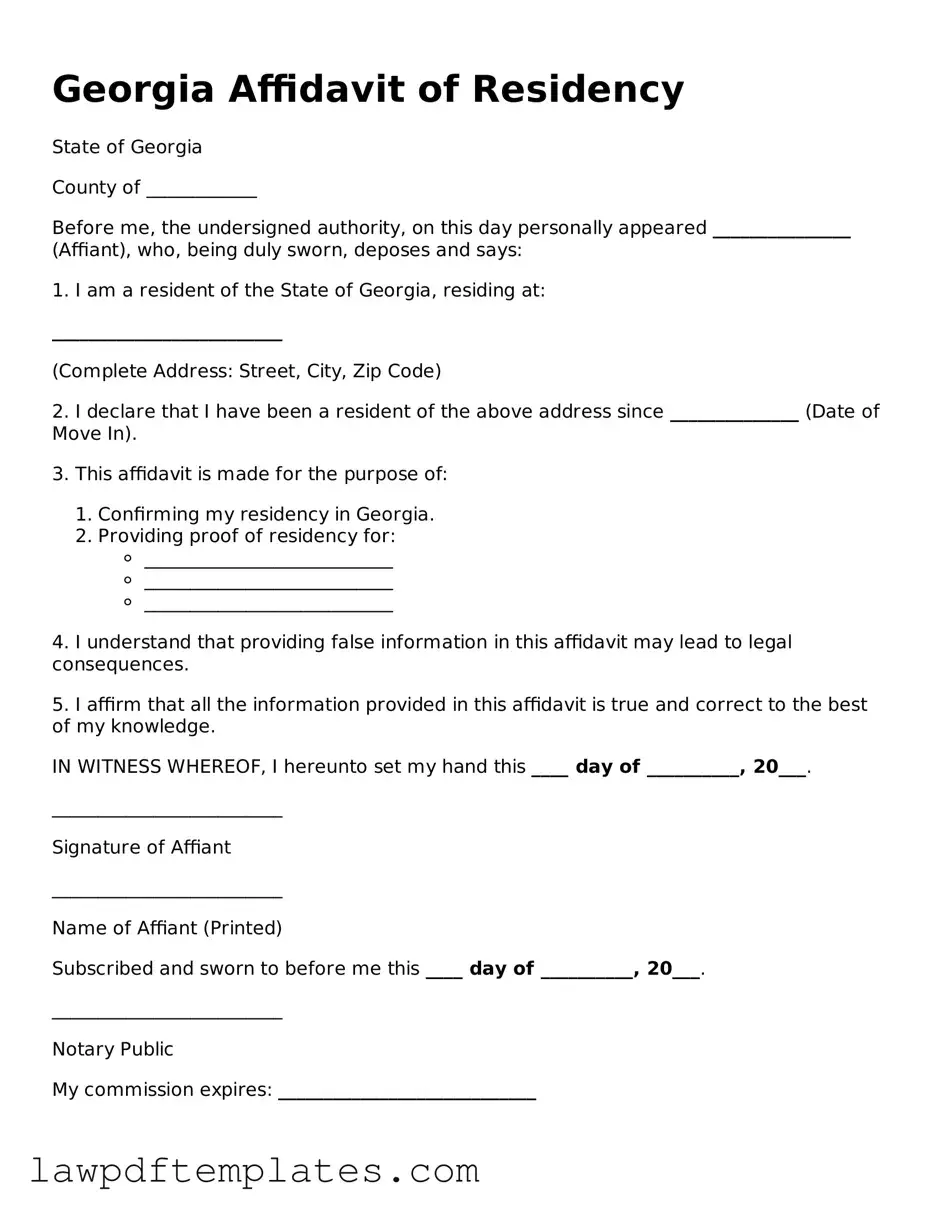Free Affidavit of Residency Template for the State of Georgia
Form Breakdown
| Fact Name | Description |
|---|---|
| Purpose | The Georgia Affidavit of Residency form is used to verify an individual's residence in Georgia, often required for enrollment in schools or obtaining certain benefits. |
| Governing Law | This form is governed by Georgia law, specifically O.C.G.A. § 20-2-690.1, which pertains to residency verification for students. |
| Who Uses It | Parents or guardians of students often complete this form to confirm residency when enrolling their children in public schools. |
| Required Information | The form typically requires the name, address, and relationship of the person completing the affidavit, along with the student's information. |
| Signature Requirement | A signature from the individual completing the affidavit is necessary, affirming that the information provided is true and accurate. |
| Submission Process | The completed affidavit should be submitted to the appropriate school district or agency as part of the enrollment process. |
| Legal Implications | Providing false information on the affidavit can lead to legal consequences, including potential criminal charges for fraud. |
Sample - Georgia Affidavit of Residency Form
Georgia Affidavit of Residency
State of Georgia
County of ____________
Before me, the undersigned authority, on this day personally appeared _______________ (Affiant), who, being duly sworn, deposes and says:
1. I am a resident of the State of Georgia, residing at:
_________________________
(Complete Address: Street, City, Zip Code)
2. I declare that I have been a resident of the above address since ______________ (Date of Move In).
3. This affidavit is made for the purpose of:
- Confirming my residency in Georgia.
- Providing proof of residency for:
- ___________________________
- ___________________________
- ___________________________
4. I understand that providing false information in this affidavit may lead to legal consequences.
5. I affirm that all the information provided in this affidavit is true and correct to the best of my knowledge.
IN WITNESS WHEREOF, I hereunto set my hand this ____ day of __________, 20___.
_________________________
Signature of Affiant
_________________________
Name of Affiant (Printed)
Subscribed and sworn to before me this ____ day of __________, 20___.
_________________________
Notary Public
My commission expires: ____________________________
Common mistakes
Filling out the Georgia Affidavit of Residency form can be a straightforward process, but many individuals make common mistakes that can lead to delays or complications. One frequent error is not providing accurate personal information. This includes misspelling names or entering incorrect addresses. Such inaccuracies can cause confusion and may result in the rejection of the form.
Another mistake involves failing to include all required signatures. The affidavit must be signed by both the person claiming residency and the individual providing the residency verification. Omitting one of these signatures can render the document incomplete and invalid.
Some individuals neglect to check the date on the form. It is essential to ensure that the affidavit is dated correctly at the time of signing. An outdated date can raise questions about the validity of the residency claim.
Additionally, many people do not provide sufficient supporting documentation. The affidavit typically requires proof of residency, such as utility bills or lease agreements. Without this evidence, the form may not be accepted, leading to further complications.
Another common oversight is misunderstanding the purpose of the affidavit. Some individuals may mistakenly believe that the affidavit serves as a legal proof of residency without the necessary supporting documents. It is crucial to understand that the affidavit is a declaration and must be backed by tangible proof.
Moreover, individuals often overlook the requirement for notarization. The affidavit must be notarized to be considered valid. Skipping this step can result in the form being rejected or delayed in processing.
Finally, some people fail to read the instructions thoroughly. Each section of the form has specific requirements that must be met. Ignoring these instructions can lead to incomplete or incorrect submissions, which can prolong the residency verification process.
Discover More Affidavit of Residency Templates for Specific States
Affidavit of Address - Form to validate your home address under oath.
For more detailed guidance on the I-864 form, you can refer to the resources available at PDF Documents Hub, which provide essential information to help you complete the document accurately and efficiently.
